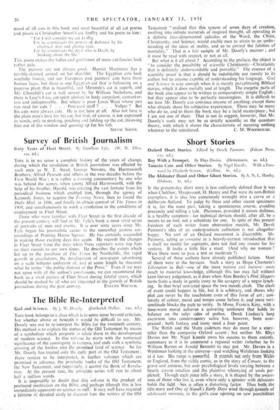The Bible Re-Interpreted
Tins book belongs to a class which is in some sense beyond criticism, but whether above or beneath it would be difficult to say. Mr. Doorly sets out to re-interpret the Bible for the twentieth century. His method is to explain the stories of the Old Testament by means of a symbolism which purports to relate them to the development of modern science. In this volume he starts witn the numerical significance of the cosmogony in Genesis, and ends with a symbolic crossing of the Jordan into the promised land of science. So far Mr. Doody has treated only the early part of the Old Testament ; there remain to be interpreted, in further volumes which are promised in advance, the prophetic books of the Old Testament, the New Testament, and (separately, it seems) the Book of Revela- tion. At the present rate, the complete series will run to about half a million words.
It is impossible to doubt that this volume is the product of profound meditation on the Bible, and perhaps (though this is less immediately apparent) on science as well. It may well have required It lifetime of devoted study to discover how the writers of the Old Testament "realised that this system of seven days of creation, swelling into infinite numerals of inspired thought, all operating in a definite four-dimensional calculus of the Word, the Christ, Christianity, and Science, would enable men to attain to an under- standing of the ideas of reality, and so to correct the falsities of mortality." That is a fair sample of Mr. Doorly's manner ; and it must be read with respect, or not at all.
But what is it all about ? According to the preface, the object is "to consider the possibility of scientific Christianity—Christianity that is definitely understandable and provable." The essence of a scientific proof is that it should be indubitable not merely to its author but to anyone capable of understanding his language. God and Science is easy enough when it is merely paraphrasing Biblical stories, which it does usefully and at length. The exegetic parts of
the book also appear to be written in comparatively simple English ; but they appear also to be perfectly meaningless. It is difficult to see how Mr. Doorly can convince anyone of anything, except those who already share his subjective experiences. There may be many who do so, and to them the book may be a lucid masterpiece ; but
I am not one of them That is not to suggest, however, that Mr. Doorly's work may not be as strictly scientific as the quantum theory, with which it shares the characteristic of meaning nothing






























 Previous page
Previous page